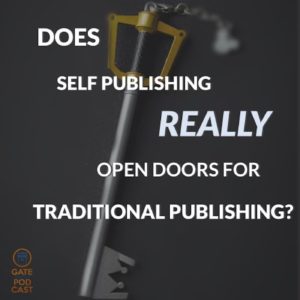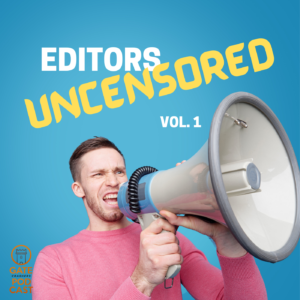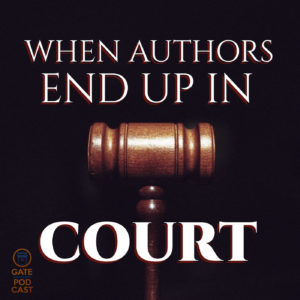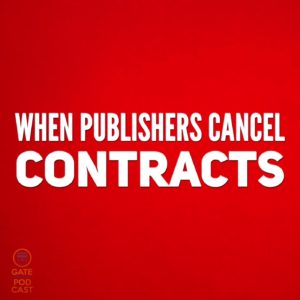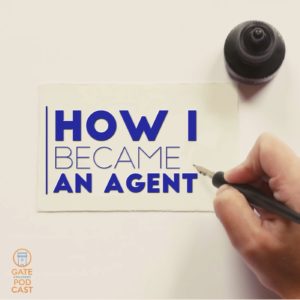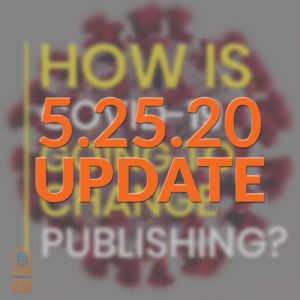- Agents
- Author News, Deals
- Awards
- Bad Poetry
- Blog News
- Books
- Career
- CBA
- Collaborating and Ghosting
- Conferences
- Current Affairs
- Deep Thoughts
- Favorite Books
- Featured
- Film
- Marketing and Platforms
- Proposals
- Publishing
- Questions from Beginners
- Quick Tips
- Religion
- Resources for Writing
- Self-Publishing
- Social Media Critique
- The Business of Writing
- The Writing Craft
- Thursdays with Amanda
- Trends
- Uncategorized
- Web/Tech
Category : Publishing
-
Continue Reading "Does Self-Publishing Lead to Traditional Publishing?"
Does Self-Publishing Lead to Traditional Publishing?
 Many authors assume that self-publishing will lead to traditional publishing.
Many authors assume that self-publishing will lead to traditional publishing.But in reality, self-publishing rarely leads to a traditional book deal.
In this week’s podcast episode, we talk about the three things that publishers look at when considering a self-published author.
Listen here: Does Self-Publishing Lead to Traditional Publishing?
-
Continue Reading "Editors Uncensored, Vol 1"
Editors Uncensored, Vol 1
What ticks editors off?What makes them cringe?What do they wish their authors knew?We asked editors to share their uncensored thoughts about the book business.So buckle up. It’s gonna get uncomfortable. -
Continue Reading "When Authors Go to Court"
When Authors Go to Court
Don’t take someone else’s ideas or content (don’t plagiarize).Don’t fabricate stories about the past and claim they are true (don’t lie).Don’t set out to make others look bad (don’t libel).Hold up your end of the publishing agreement (don’t breach your contract). -
Continue Reading "To Work or Not To Work With a Particular Agent"
To Work or Not To Work With a Particular Agent
Thoughts on agents as the publishing industry continues to transform:
Someone wrote to say, “I’ve been offered a contract on my novel. Since I don’t have an agent, should I seek one at this point? And if the agent accepts, should he or she still receive 15% of the deal, even if they didn’t market my book or secure the deal for me? Would it be better to have the agent simply review the contract for a fee?”
There’s quite a debate about this issue. I suppose many agents would say, “Sure — call me!” They’d be happy to get 15% for a deal they’ve done no work on. But my advice would be to think long term. Is there an agent you like and trust — someone you want to work with in the long term? If so, call him or her. Talk about the situation. Explain that you’ve already got a deal. The agent may be willing to take less in order to work with you. They may review the contract for a fee. They may have some insight into your situation. But don’t sign with someone just because you think you need an agent and someone is willing to say yes. If, for example, you’ve got a $10,000 advance coming, make sure it’s worth the $1500 to have the agent assist with this contract. Sure, it may be worth it — if you’ve got a complex situation, or a novel that is going to be made into a movie, or a potential bestseller… those probably call for a good agent to get involved.
That said, it doesn’t really seem fair to me to take the full commission for a book I didn’t sell, though not everyone in the industry agrees with me. You can always talk with a contract-review specialist, who will review your contract for a flat fee (usually somewhere in the $500-to-$1000 range). You can
-
Continue Reading "What Happens When Publishers Cancel Contracts"
What Happens When Publishers Cancel Contracts
Yes, there are times that publishers cancel book contracts.
But it’s never an emotional decision. It’s always done for very specific reasons. So no, your publisher isn’t going to wake up one day and suddenly decide they don’t want to do your book anymore.
Listen to the podcast episode to put your fears to rest.
-
Continue Reading "Marketing Your First Novel – Chats with Chip"
Marketing Your First Novel – Chats with Chip
We’re bringing back some of Chip’s blog posts for both your reading pleasure and to bring some insight for authors in a constantly evolving industry. Enjoy! Feel free to comment below.
Marketing Your First Novel
I received a fascinating email from a first-time novelist the other day. She said that her very first novel is releasing, it’s with a medium-sized house, and she said, “While I’m not exactly sure what the publisher may do to market my book, I’m wondering what advice you give to the authors you represent in order to help them market their first novel.”
First, I wrote back to her and said she should simply ASK HER PUBLISHER what exactly they’re doing to help market her book. It may not be much (publishing works on the Pareto Principle, where 80% of the resources flow to 20% of the books), but she should certainly know what they are doing. So get a little clarity by asking. Are they taking out an ad in a trade magazine? Purchasing a group ad? Buying placement in front of Barnes & Noble? Sending out review copies? Offering terms to Amazon? Whatever it is (and it may not be much), it would be nice to know, so that the author doesn’t duplicate the publisher’s efforts.
Second, I suggested she simply make a list of the things SHE CAN DO to help market her book. Can she put together a blog tour? Do a launch party with friends at a local bookstore? Set up an event on Facebook? Arrange to get into her local newspaper and onto local radio stations? Every author can do SOMETHING… so what is it you can do?
We had a nice chat about this via email, then she asked me another question: “Would you be willing to show me the sort of letter you send to a first-time novelist you represent?” I thought that was a brilliant question,
-
Continue Reading "Let’s Talk Children’s Publishing"
Let’s Talk Children’s Publishing
 What’s your idea for a children’s book? Most authors have one. Whether you typically write adult romance or business nonfiction, chances are you have an idea for a picture book, chapter reader, or kids novel. Chances are, you’ve even written some of it down!
What’s your idea for a children’s book? Most authors have one. Whether you typically write adult romance or business nonfiction, chances are you have an idea for a picture book, chapter reader, or kids novel. Chances are, you’ve even written some of it down!But is it worth an author’s time to pursue a career in kids publishing—especially if writing for children isn’t their true “calling”?
-
Continue Reading "How I Became a Literary Agent"
How I Became a Literary Agent
I had no previous book publishing experience.
In fact, when I first started working with Chip MacGregor, I wasn’t fully sure what an agent did.
So how did I get to become a book agent? We discuss my journey in this week’s episode of the Gatecrashers Podcast.
-
Continue Reading "An Update on How COVID-19 Is Affecting Book Publishing"
An Update on How COVID-19 Is Affecting Book Publishing
 It continues to be an interesting time for book publishing.
It continues to be an interesting time for book publishing.In this update we share information that was provided by Penguin Random House, looking at at the book categories that have taken the biggest hits along with the ones that have done well.
We also discuss why the “free ebook” movement at the beginning of the pandemic turned out to be a bad idea, and we offer a bit of good news as bookstores begin to reopen and the Big 5 Publishers put in place initiatives to help keep independent retailers afloat.
Listen to the May 25 update on how COVID-19 is affecting book publishing.
-
Continue Reading "Cover Art and What You Should Know"
Cover Art and What You Should Know
 I’ve worked with many authors who have said that the whole “publishing thing” didn’t feel real until they received their cover art. Maybe it was finally being able to visualize the book as it would be in stores. Maybe it was seeing their name in specialized fonts. Whatever it was, receiving covert art is a turning point for many authors. It’s when the process goes from dream to reality.
I’ve worked with many authors who have said that the whole “publishing thing” didn’t feel real until they received their cover art. Maybe it was finally being able to visualize the book as it would be in stores. Maybe it was seeing their name in specialized fonts. Whatever it was, receiving covert art is a turning point for many authors. It’s when the process goes from dream to reality.While the cover art process is an important one, few authors know what to expect, how to navigate it, and, if they’re self-publishing, how much they should expect to pay. In this week’s episode of The Gatecrashers Podcast, we discuss all that and more. Listen in on our conversation on book cover art.


